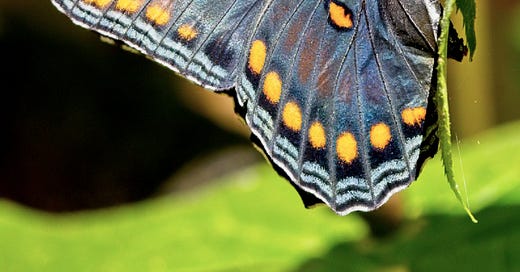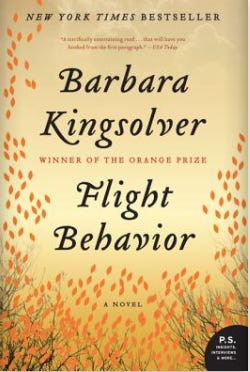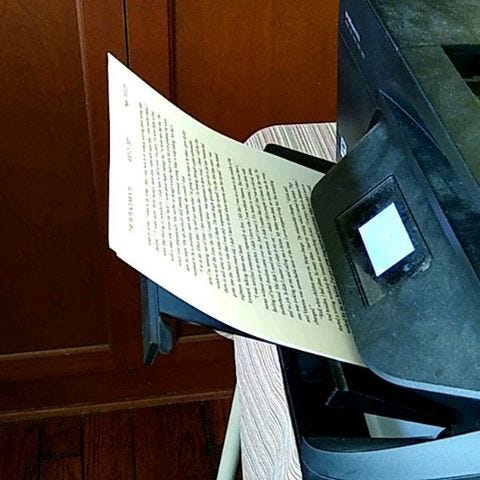Welcome! You’ve reached Spark. If a book club married a writer’s group, this community would be their child. Learn more here or just read on. If you received this from a friend, please join us by subscribing. It’s free! All you have to do is press the button below. Thanks for joining us!
In this issue:
Luck: it isn’t fair but it makes for good stories
Butterflies and their effects
Great reads from fellow Sparkers, two of the best lottery stories ever told
But first, some questions that keep circling in my brain in search of answers
The Olympics: Do we care? Should we care? Who will be watching?
Will watching Ted Lasso turn us all into soccer, excuse me, football fans?
Has there ever been a book , movie, TV show, or a piece of art or writing that made you care more about a sport or sports than you ever thought you could?
What if…

When I think about how I came to be at all in this world, I sometimes have to sit down and catch my breath. All it would have taken to miss the past sixty-five years is for my mother to have married the guy she was engaged to before she met my father. Even on the night of my conception there were no guarantees that the right sperm would meet the right egg to make the one and only me. (Whether or not I’ve added much to the planet is another question entirely).
According to the “butterfly effect” theory, which I may be stretching here to make my point, the smallest change can lead to very different outcomes in the long term.
This keeps me humble. I realize I don’t deserve any of the things I’ve received or lost during those sixty-five years. I didn’t lift a finger to determine who my parents would be, my race, my gender, my prospects for good health, or the country into which I’d be born, yet all of these factors and more shaped what has followed.
It all came down to chance. The spin of a wheel. The roll of some dice. A lottery. I am aware that in the greater scheme of things, I lucked out. Some might say that chance doesn’t enter into it; I and everyone else who made it into the world are meant to be here because we are part of a divine plan. I was happy enough to believe that when I was a kid but it doesn’t wash now. I am an accident of fate and biology and happy to be here.
I’ve been fascinated by lottery stories all my life. I’d hate to tell you how many hours I’ve lain awake at night imagining how I’d handle winning a life-changing sum. Granted, most of these late-night fantasies came to me when I was in my twenties with a young child, lacked health insurance, and was chronically overdrawn at the bank. I concocted elaborate scenarios in which I somehow managed to win millions of dollars and no one would find out. I would not, I was sure, fall prey to the “curse of the lottery.”
The “what-ifs” posed by a lottery story plunge to the heart of humans. They expose our dreams, our fears, our egos, our needs, our despair, our banality. Even when we want to believe that we would be good, moral, different and often feel grateful for what we have, we are subject to the lure of the lottery.
I have an old notebook filled with scribblings for about a dozen different short stories all to do with lotteries. One was inspired when a man I knew told me he used to play his ex’s regular lottery number after they divorced. If she won, she’d be forced to split it with him in a kind of lottery-justice-vengeance scenario. Today, I retrieved a lottery story I actually drafted and rewrote almost twenty years ago when I was very much learning how to write fiction. I had vague ideas of dusting it off and sharing it with you this week but I was horrified when I read it. The idea was sound, the characters good, but the writing would only make you embarrassed for me. So you are spared.
Instead, here are two classic lottery stories that haunted me when I first read them years ago and still shake me when I read them now: The Lottery by Shirley Jackson and The King of the Bingo Game by Ralph Ellison.
Each one is famous. Each one holds so much more than a story about luck bestowed or lost. In Jackson’s brief account of a town’s annual lottery to decide who they should sacrifice for the greater good, we feel the self-delusion of the main character, a housewife, convinced that whatever happens it will be to someone else, someone who, perhaps, deserves it.
Here’s a reading of the “The Lottery”:
In Ellison’s “The King of the Bingo Game” , a young Black husband desperate for money to help his sick wife holds the winning Bingo card. All he has to do to win his $36.90 is to spin the wheel and hope it stops at the double zero. We feel his desperation and his hope as he discovers the power of not knowing. As long as he holds the button that keeps the wheel spinning, he has not lost.
Listen to Ralph Ellison’s “King of the Bingo Game” or watch this short film based on the story here. This dramatization exactly captures the feeling of the book:
We are all butterflies
“It fell to the floor, an exquisite thing, a small thing that could upset balances and knock down a line of small dominoes and then big dominoes and then gigantic dominoes, all down the years across Time. Eckels' mind whirled. It couldn't change things. Killing one butterfly couldn't be that important! Could it?” ― Ray Bradbury, A Sound of Thunder
The idea: one infinitesimal change in a system with many moving parts can lead to drastic changes in that system. The idea was introduced by meteorologist Edward Lorenz of MIT after he discovered that rounding a number in a computer simulation of weather systems drastically transformed the weather forecasted by the model.
His finding blew open the doors of the classical understanding of nature itself which had rested on Isaac Newton’s laws of nature which would give us an entirely predictable “clockwork universe” once we understood all the variables that exist here and now. Lorenz’s theory showed that it was far more difficult to predict what might come of a small change and led to “chaos theory.”
These are my takeaways from this excellent, brief, and very readable piece “When the Butterfly Effect Took Flight” by Peter Dizkies in MIT News Magazine.
This article also shows how the “butterfly effect” made it into the popular culture. Like lottery stories, the concept has aroused the imagination of storytellers like Ray Bradbury. His short story “A Sound of Thunder” is about a man who travels back in time to indulge his desire to shoot a Tyrannosaurus Rex but, while there, violates the rules and steps off the path inadvertently killing a butterfly. It’s a brilliant, brief look at how a human’s ego, fear, and carelessness have consequences that echo far beyond the moment.
Listen: Ray Bradbury’s story A Sound of Thunder
Barbara Kingsolver’s Flight Behavior
It’s hard to imagine that my time here on earth could affect anything outside my immediate circle but I’d have to live a few eons to know and even then I might ever really know except that I would be one of the billions who have contributed to the acceleration of global warming and climate change. Monarch butterflies are at the center of Barbara Kingsolver’s 2012 novel Flight Behavior but it is really a look at how climate change has altered their behavior and environment, and threatens our own. The beauty of this novel is that the idea is never pounded or preached -- it simply unfolds as a young native of rural Tennessee discovers the butterflies, her world, and herself.
More Reads
Are you a lottery junkie in search of a safe fix? Here is a really BIG list of books with lottery themes on Goodreads:
Here’s a short piece about how rain on one continent impacts butterflies on another. How rain in Africa drives butterfly bursts in Europe (Vox)
What Sparkers are Reading
Elizabeth Aquino of Los Angeles won the drawing (lottery!) for W. Bruce Cameron’s A Dog’s Purpose which she hopes to read with one of her students who is a dog lover but struggles sometimes with reading.
Joyce of North Carolina checked in to share these reads:
The Last Ballad by Wiley Cash which takes place in 1929 at a NC Mill Town. The main character Ella May Wiggins joins the Union and persuades African Americans to join her. “The book is sorrowful and a part of history that is swept under the radar. “ Also from Joyce:
Lone Wolf by Jodi Picoult. “I enjoyed this book even though the family had to make tough decision whether to remove life support for the brain dead father. A good read.”
The Diplomat's Wife by Pam Jenoff, the main character survives Nazi prison camp and marries a diplomat. Very good historical romance.
Always Looking Up by Michael J Fox. this read is a good in site of his struggles with Parkinson Disease touching on work, Politics, Faith and Family.
Split Second by David Baldacci (currently reading), “ a Secret Service thrille -- lots of action, easy to read. I look forward to it every night.”
One step closer...
So, this happened on Wednesday. This is the first time I’ve printed out a draft of my novel-in-progress. I know many of these 116K words will have to go and new ones will have to be found but I can’t deny the rush I felt when I saw the stack of pages. I realized that all these months (okay, years) of floundering resulted in something solid that I can work with.
Coming soon
Andria Williams, author of The Longest Night, will open up about her writing life, the perilous trek towards a “second novel,” and what makes her excited about being on the editorial team at the literary publication Wrath Bearing Tree.
The Writer’s Dog: More interviews with the canine assistants of writers like Bobi Conn, author of In The Shadow of the Valley: A Memoir and R.D. Kardon, author of Flygirl, and Matt Coyle, award-winning author of the Rick Cahill thrillers.
Your moments of Zen and what you reading, thinking about, working on — don’t hold back! We want it all.
That’s it for this week. If you like something you’ve found here today, let me know by hitting the “like” button (the heart) down below and/or leaving a comment. It’s fun to hear from you and I am ready to pay very close attention to your feedback :). Also - spread the word! Here’s a button for that:
As always, browse for any of the books mentioned in this or any issue of Spark at the Spark Community Recommendations Page at bookshop.org where every purchase supports local bookstores. Any commission we make on the sales will go to support a literacy program we all choose when we’ve got enough to make a difference.
Ciao for now.
Gratefully,
Betsy
P.S. And now, your moment of Zen…the hydrangea effect — on butterflies
This week’s Zen moment comes from Katrina Kenison, author of The Gift of an Ordinary Day, Magical Journey, and more. The lesson here: help it bloom and they will come. For the full butterfly effect, click HERE and watch the video. A moment of pure Zen.
Calling for Your Contribution to “Moment of Zen”
What is YOUR moment of Zen? Send me your photos, a video, a drawing, a song, a poem, or anything with a visual that moved you, thrilled you, calmed you. Or just cracked you up. This feature is wide open for your own personal interpretation.
Come on, go through your photos, your memories or just keep your eyes and ears to the ground and then share. Send your photos/links, etc. to me by replying to this email or simply by sending to: elizabethmarro@substack.com. The main guidelines are probably already obvious: don’t hurt anyone -- don’t send anything that violates the privacy of someone you love or even someone you hate, don’t send anything divisive, or aimed at disparaging others. Our Zen moments are to help us connect, to bond, to learn, to wonder, to share -- to escape the world for a little bit and return refreshed.
I can’t wait to see what you send!
(And if you’ve gotten here, liked something, and still haven’t hit the heart below, now’s your chance! )








Thanks to you, my husband and I listened to The Lottery reading on our way to Maine last weekend. I hadn't read it since 8th grade, he never had. We were both mesmerized, disturbed, and reminded all over again of the power of a great short story. Thank you, Betsy! (Thanks, too, for sharing my Monarch video with your readers!)
Lottery stories are very intriguing. The Hunger Games starts with a lottery that reminded me of Shirley Jackson’s Lottery. David Baldacci has a book called “The Winner,” that I found fascinating. It’s a rigged lottery, a young woman wins, and it becomes a dangerous affair.
I have let milkweed grow in my yard for the butterflies. I also have a blooming hydrangea bush. How exciting that the Monarchs will also be drawn to that. I’m finding that leaving portions of my yard untouched brings forth many beautiful and interesting surprises. I add “Flight Behavior” to my TBR list! Thanks for your news this month! Mary